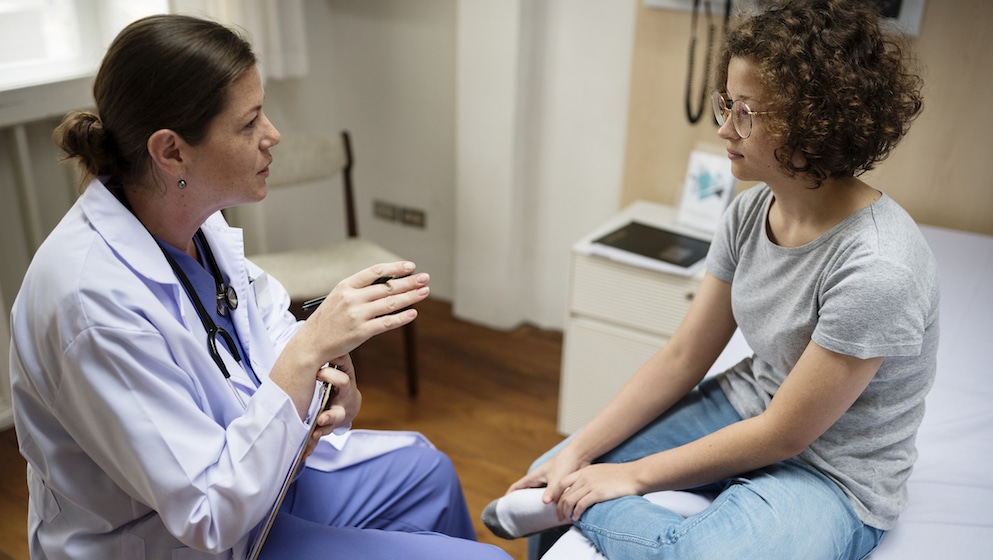7 complications associated with Crohn’s disease

A necessary part of managing Crohn’s disease is following your treatment plan. Not only does proper treatment help ward off flares and potentially even put you in remission—but it may also reduce the risk of complications that can arise when Crohn’s disease goes untreated. Still, closely following a treatment plan does not guarantee the avoidance of complications. Here’s what you should know about the potential health risks of Crohn’s disease.
1. Malnutrition
Crohn’s disease can affect your appetite and how much nutrient-rich food you’re consuming—and your body may also have trouble absorbing nutrients from the foods you do eat, resulting in malnutrition. “This can occur when there’s a lot of disease activity,” says David I. Fudman, MD, assistant professor in the department of internal medicine at UT Southwestern Medical Center in Dallas. The main thing is to work on getting disease control with medication or surgery—once the inflammation is controlled, malnutrition can be addressed, he adds.
2. Ulcers
When Crohn’s disease is active, ulcers can form in any part of the GI tract, from your mouth to the anus. “Ulcers are the sine qua non of Crohn’s disease,” says Adam S. Cheifetz, MD, director of the Center for Inflammatory Bowel Disease at Beth Israel Deaconess Medical Center and associate professor at Harvard Medical School in Boston, Massachusetts. “Treating the inflammation and healing the intestinal tract, and healing these ulcers, is what will hopefully then prevent other complications like fistulas, abscesses, or strictures.”
3. Bowel obstruction
Bowel obstruction results from narrowing in the small intestine. This can be related to inflammation in the walls of the small intestine, which causes the narrowing. In that case, treating the inflammation with medication can help resolve the bowel obstruction. However, when inflammation occurs over time, it can cause scarring in the bowel, resulting in a more permanent narrowing in the bowel that’s known as a stricture—another type of bowel obstruction.
“Strictures don’t improve with treatment because they’re a scar, not inflammation,” says Dr. Fudman. “So a lot of patients who have strictures manage bowel obstruction by following a strict, low-residue diet.” For more severe cases of bowel obstruction, surgery may be necessary to open up the bowel.
4. Abscesses
These small pockets of pus, often due to bacterial infection, can form as a bulge in the intestinal wall. “They can occur when Crohn’s disease is very active, either in the abdomen or peri-rectal area,” says Dr. Fudman. “Depending on the circumstances, treatment can include antibiotics plus treatment for the underlying inflammation, or it could include antibiotics plus draining the abscess. Sometimes it can require surgery, especially for larger abscesses, though typically we try to avoid that.”
5. Fistulas
When a deep sore or ulcer creates an abnormal passageway in the digestive tract, it’s known as a fistula. “Most people won’t even know they have them,” says Dr. Cheifetz. “Fistulas really only become a problem if they go from high up in the small bowel down into the colon, or if they go from the intestines to other organs like the bladder.” Treating the Crohn’s itself can help, as can antibiotics, though sometimes fistulas may require surgery.
6. Fissures
Tears in the lining of the anus are known as fissures. Unlike fistulas, they only occur in the anus. “They can be quite uncomfortable,” says Dr. Fudman. If they don’t heal on their own, various medications, as well as topical creams or sitz baths, are often used to treat fissures. Surgery is sometimes used to treat fissures.
7. Colon cancer
When you have Crohn’s disease that affects a significant portion of your colon, it increases your risk of colon cancer. “If you just have disease in the small bowel or in the very beginning of the colon, you’re not at any higher risk than if you didn’t have Crohn’s disease,” says Dr. Cheifetz. Talk to your doctor about your risk, and how often you should be screened for colon cancer.
Can treatment ward off complications?
Staying on top of your Crohn’s treatment may help reduce the risk of complications. “In the past, the fear was the rare risk of certain Crohn’s medications, and there was more reliance on medications that didn’t work as well but didn’t have a lot of side effects,” explains Dr. Cheifetz. “Nowadays, we realize that Crohn’s is a progressive disease. The goal now with treatment is to get patients into remission before they develop these complications,” adds Cheifetz. “That’s why we’ve become more aggressive with earlier treatment.”
And there are even more Crohn’s treatments on the horizon. “There are a lot of drugs in the pipeline, we have new drugs coming out relatively frequently, and there are lots of ongoing drug trials, so that’s very promising,” says Dr. Fudman.
Medically reviewed by Jenny Blair, MD


